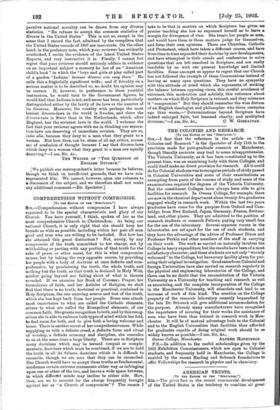THE COLONIES AND RESEARCH.
[To THE EDITOR OF THE " SPECTATOR."] SIR,—I fear that the reference in the article on " The Colonies and Research " in the Spectator of July 11th to the provision made for post-graduate research at Manchester, though literally accurate may lead to some misapprehension. The Victoria University, as it has been constituted up to the present time, was an examining body with three Colleges, and could itself make no direct provision for research. All it could do for Colonial students was to recognise periods of study passed in Colonial Universities and some of their examinations as exempting from parts of the courses of study and some of the examinations required for degrees of the Victoria University. But the constituent Colleges have always been able to give facilities for research. In Owens College, for example, there are now in the chemical department alone twenty-five graduates engaged wholly in research work. Within the last two years graduates have come for the purpose from Oxford and Cam- bridge, from New Zealand, Japan, Germany, France, Switzer- land, and other places. They are admitted to the position of research students or research Fellows, paying very small fees for the use of the laboratory. Several separate rooms in the laboratories are set apart for the use of such students, and they have the advantage of the advice of Professor Dixon and Professor Perkin and other members of the staff in carrying on their work. The work so carried on naturally involves the College in heavy expenditure, but the results have been of a most satisfactory character; and these students are not only " warmly welcomed" to the College, but have every facility given for pur- suing their original investigation. Graduates from Colonial and foreign Universities have also carried on research regularly in the physical and engineering laboratories of the College, and there can be no doubt that the reconstitution of the Victoria University as a University for teaching and research as well as examining, and the complete incorporation of the College in the Manchester University, will stimulate and lead to an increase of work of this kind. The erection on the College property of the research laboratory recently bequeathed by the late Dr. Schunck will give additional accommodation for the purpose. Already many manufacturers have recognised the importance of securing for their works the assistance of men who have been thus trained in research work in Man- chester. It will be of mutual advantage both to the Colonial and to the English Universities that facilities thus afforded for graduates capable of doing original work should be as widely known as possible.—I am, Sir, &c., P.S.—In addition to the useful scholarships given by the 1851 Exhibition Commissioners, which are open to Colonial students, and frequently held in Manchester, the College is enabled by the recent Harling and Schunck foundations to offer Fellowships for research in physics and in chemistry.






































 Previous page
Previous page